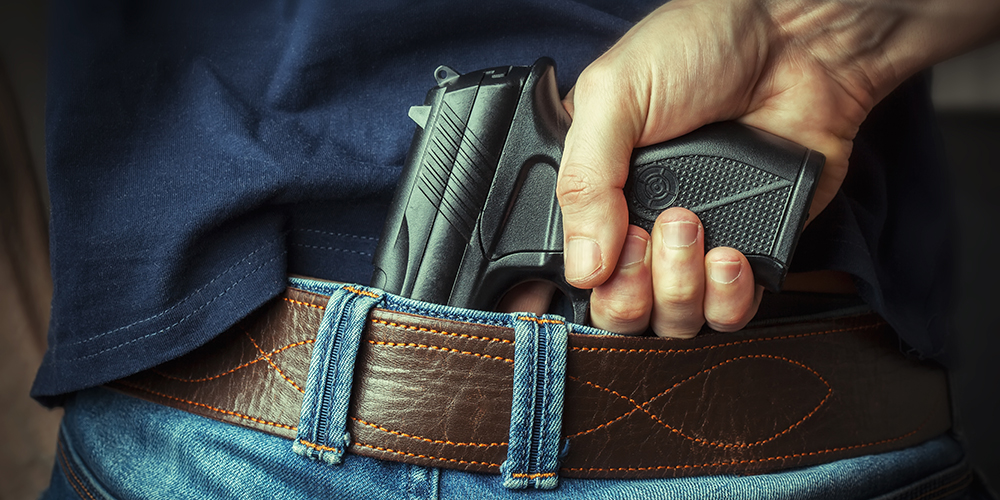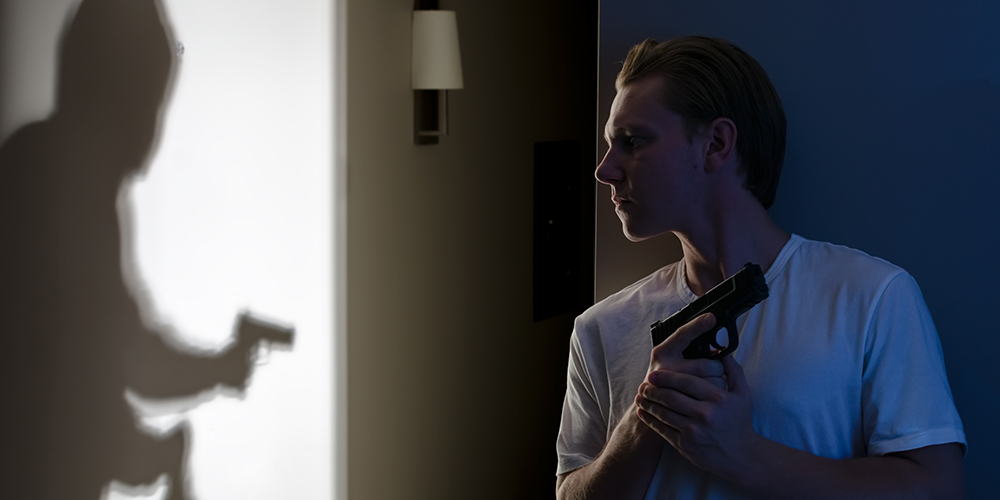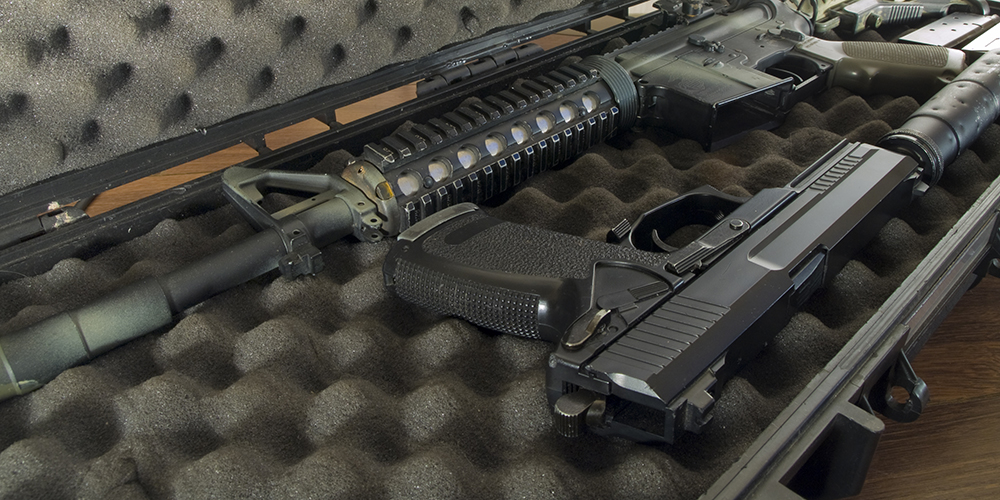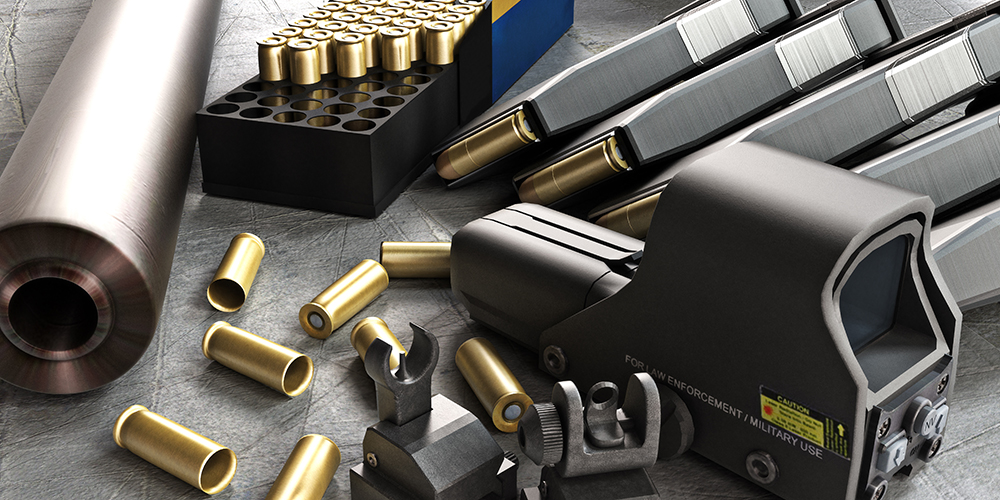Lock Blog
A resource for consumers, locksmiths, and security professionals
A resource for consumers, locksmiths, and security professionals

I am coming into this not knowing the answer. I really don’t have a stance on gun control, other than firm neutrality. I believe that the United States Constitution is very clear about our right to carry. I have used guns. I do not own one. I do, however, own many weapons. I believe in using what is practical, and on this journey, I hope you find out if I should have a firearm in my home. Remember that guns deliver lethal force no matter what it says on your ammunition. If you are not in a situation that does not demand lethal force, do not use a gun. To understand the argument for guns as security, we need to understand a little bit more about these weapons: what they can do, their limitations, and their strengths. This is not a simple topic, and I do not intend on treating it like one. I must remind everyone that they should not break the law, and neither I nor the Lock Blog endorses breaking the law.
In order to use a gun, you must have a situation that demands lethal force. In order to understand what situations demand lethal force, we need to familiarize ourselves with a few terms, and how they relate to the threat of harm. These terms are:
Intent – This can be in the form of actions or words. Someone who is claiming they are going to kill or harm you shows intention, and aggressive actions display intention. The way this is gauged is a little tricky. These actions/words must be grave enough to lead a “reasonable” person to fear for their safety. What exactly is reasonable is a debate for philosophers and defense attorneys.
Ability – Most obviously this is associated with what the aggressor is carrying. Some weapons are more obviously threatening than others, and some items are more obviously weapons than others. Where there could be a reason for a person to carry a hammer, very few people need to carry a single brick. Then there are obvious weapons, such as knives and guns. When it comes to hand to hand combat between two similar opponents, most courts would disagree with the idea that the threat of harm was severe enough to warrant lethal force. However, a person that is being attacked by multiple unarmed opponents leads to a disparity of force, and lethal force may be necessary. If your attacker is alone, and in your weight class, then you are most likely not able to use lethal force.
Opportunity – Are they in a position to use their ability to carry out their intent? Threats over the internet, social media, or phone calls do not give the person opportunity. Though these threats may be serious and illegal, you are not in your legal right to use lethal force against the person threatening you. Someone without opportunity would need to be tracked down, which makes your actions premeditated, and very illegal. You hear about this every once in awhile with a victim returning to kill an attacker after they have escaped the situation. Once you have escaped, you have removed the attacker’s opportunity to do you harm.
The old adage goes, “Bad guys use violence. Good guys use force.” This distinction is what draws the line between protection and criminality. Use this framework to determine whether a situation would be complicated, or solved, by using lethal force. Also, remember that firing a gun is always lethal force. There are no ifs, ands, or buts, about it. It does not matter what type of gun it is (as long as it is a real firearm). It does not matter what type of ammunition you put in it. And it does not matter where you shoot them on their body. When you pull that trigger, you are committing to the use of lethal force.

The most important thing about mental preparation is not being afraid of your weapon. The best way to achieve that preparation is to understand your weapon. If you have no interest in using or understanding your weapon, then this is not the right method of protection for you. You must also be prepared beyond the idea of firing your gun. If it is a gun you are purchasing for self-defense, then you must be prepared to shoot it at another human being. Also, you need to know the truth about your weapon.
If you point the gun, you need to be prepared to use it. You cannot bring an empty gun to a confrontation. You must also come to terms with the idea that you may miss, and probably will miss (even if you have a shotgun). One shot may not be enough to stop your target (even if you have a shotgun). A shotgun is not the cure-all for the gun illiterate. It takes skill. You need to aim it. And you need to practice with it. Maybe the biggest thing is to not be bullied into using something that does not work for you. You might need lower velocity rounds or a lower caliber. What someone calls a girl gun might be what you are comfortable with. Do not let your ego compromise your security.
There is also the flip side of the tentative user. This is the overzealous gun owner. The person that wants to use the gun they buy for the purpose they bought it for. This is also not the right way to be. You want to be prepared to do what you have to, and never have to do it. Stay away from mindsets that prescribe shooting to kill at all times. The saying, “If they don’t die from the first shot, shoot them again” is not acceptable. You are only defending yourself as long as a threat is being posed. If the intruder is no longer a threat to anyone, i.e. immobilized, then you cannot shoot them again. That is crossing a line, and it makes you a criminal.
Yes, you must be prepared for the person you shoot to die. No, you should not be hell bent on that person dying. That is not to say that you have to do the person you are shooting a favor. There is no way to protect a person you are shooting from harm. It is true that even a leg wound can still kill a person. People are meat sacks full of fluids. Once that sack is punctured, a lot can happen. Be prepared for death, but do not think of yourself as the executioner. When they stop their dangerous behavior, you stop shooting.
How much space do you have to store the weapon? If you fire it, where is the bullet going to go? Are your walls strong enough to prevent over penetration? Are you putting other people in the house in danger by firing off a round? You should always know what is beyond your target. The size of your gun may also not fit the size of your environment. Can you turn a corner with your gun positioned to take the shot? Are you going to be knocking over lamps and such by trying to turn around quickly?
Take into account that a shotgun takes up about the same space as a pistol once your arms are fully extended. It does you absolutely no good if you cannot use your weapon in the environment you want to protect. Beyond using your weapon, you must be able to use it effectively. Another part of the environment is how the gun is stored. Can you access the firearm quickly? A gun that is under lock and key keeps kids out, but it also keeps you out. Where the gun is stored may also lead to some inconvenience. The closer it is, the faster you can reach it.
The bullets/shells you put in your weapon determine what the weapon will do. If you cannot handle recoil you may need lower caliber or low recoil rounds. This will also determine what type of damage you want to do to the person you are shooting. Are you going to use something lethal, or are you going to use something less than lethal? It is important to note that even if it is not your intention to kill someone when you use a gun, there is always the possibility they will die. It is hard to kill someone with beanbag rounds, but it can happen. Point blank shot to the throat and slow medical response might just end someone’s life. That goes back to mindset.
Even if you do not want to kill anyone, you are taking that risk by shooting your weapon. There is also operator error. If you have both lethal and non-lethal rounds, then you may lose track of which one you have loaded in the weapon. This may give you the indication that you are just shooting to stop when, in reality, a shot is going to end a person’s life. No matter what your ammunition is, or what you think it is, you must come to terms with the severity of pulling the trigger. And do not expect people to fall over as a result of your chosen ammo. There are all kinds of situations where non-lethal, and even lethal rounds, may not drop your target. Different body tolerances, shot placement, and even drug use could give you some unexpected results when you go to put down an attacker. Also, no matter your ammunition, there is a strong chance of the shot going through the wall to the other side (even with birdshot).
The price of a gun can be anything from a few hundred dollars to thousands. Buying a gun on a budget is entirely possible, but it will limit you. Besides the price of the gun itself, there is the price of everything you need along with it. This means ammunition, cleaning supplies, and perhaps even a safe or lockbox to store it. Understand the financial commitment before just going out to buy a gun.
If you have children, you are going to need to secure the gun. The purchase of a very expensive gun may increase your desire to keep the gun in a nicer case. Cost can compound very quickly, and doing things on the cheap is a sure way to endanger your home and make it susceptible to break-ins. Remember that security is always an investment. The same concept can be applied to other aspects of your home security. Would you want to buy door locks from a trustworthy brand or an untrustworthy one just because their cheaper? I doubt it.
When something is moving around in your home at night, you have no idea what it is until you see it. Do not go off half-cocked. The intruder might be a police officer exercising their rights for a no-knock warrant, and they may have the wrong house. It might be an animal that has gotten into the house, in which case there may be no need to defend yourself with lethal force. It could even be a Robert Downey Jr. situation, where the person thinks that they have entered into their own house (perhaps due to the influence of narcotics).
Always be aware of what you are shooting, and never fire blind. Something like a flashlight is needed for night time protection. Be aware that the light on your gun may temporarily blind you. Consider getting a red gel for your light (one of many amazing tips for people who live alone) so that your eyes will not need to readjust, but you can still see in the dark. One thing is certain. You need to know what the threat is before you pull that trigger.
Guns make a lot of sounds. You might damage your hearing if you don’t take the proper precautions. The sound may also stun you if you have never heard your gun shoot without ear protection. However, the sounds that a gun makes are not always negative. Racking a shotgun might be all it takes to send a perpetrator running for the hills, but you should not rely on that. The information you give away by racking your weapon might give the criminal a leg up. If they did not know someone was home, now they know, and they know you are armed. If they are also armed, they may be on high alert. Something like a pistol with a suppressor will keep you concealed pretty well. A suppressor will also allow you to maintain a certain level of surprise if there are multiple assailants in the home.
Many people that buy a gun do so with the intention of never using it. This is a mistake. You should use your weapon often to keep a familiarity with it. Such preparation will ensure that you are ready to act in the event that you need to use your firearm. Go to the firing range and test your weapon with the ammunition you want to use. Different ammunition behaves differently. If you are not shooting what you will be using for home protection, then you do not have the proper training.
Though is it good to fire at the range, it is also necessary to know how the gun will fire in a practical application. Many people do not consider the sound that their weapon is going to make. After firing a rifle in your home, you are going to be pretty deaf. Lack of sensory awareness is going to limit your effectiveness, and potentially create danger for others. It sucks to do, but you are going to have to shoot your weapon without ear protection. If you do not know what the gun really sounds like, then you are putting yourself, and many other people in danger. You may have to use the gun at night, and that means you should practice firing the gun at night, or in the dark, using a flashlight mount.

These problems are by no means meant to imply an anti-gun stance. All I care about is how you are protected. There are most definitely workarounds for these issues, but they are still things to consider.
A gun is not something that you set up, and it protects you. When you are not around, your gun it does not protect you, your home, or your family. A gun that is left alone is just something for a criminal to steal. And for anyone who would offer “booby traps” as a solution to this issue, I would remind you that setting something like that up is very illegal.
Most of the problems that will come up in gun use stem from the user. People often say that “Guns don’t kill people. People, kill people.” This is true. A gun is a tool. If it is doing something wrong, that is because a person did something wrong. This comes down to every aspect of the gun owning process. Everything from improper storage, to not checking the chamber before what you thought was a dry fire. When guns are around people, your security is at risk. If you can make sure that only the people that are responsible with firearms have them, then you deserve a Nobel Peace Prize. Even trained users make mistakes. To err is human. It just happens to be that errors with guns damage security, and endanger lives.
This has been a long-debated issue, but so far the evidence I have seen makes a stronger case for gun ownership increasing risk. The American Journal of Epidemiology did a national survey where they discovered certain trends in gun ownership. Specifically, gun ownership was found to increase the risk of “dying from a homicide in the home”. Also, the risk of suicide was found to be greater. All of this was “regardless of storage practice, type of gun, or number of firearms in the home”.
You can choose to reject this study, but the methodology seems as unbiased as it could possibly get. Essentially, it is just an analysis of death certificates. These findings are not unique, but this particular study is a little more straightforward. All these studies do is reaffirm common sense. Your chances of being eaten by a shark go up if you go to the beach every day. Your chances of being stuck in a car lockout go up if you happen to leave your car keys at home. A person that owns a gun spends more time around guns and, therefore, has a higher risk of being shot.
The most recent FBI Crime Report showed that guns are a popular item to steal. In 2014, $139,127,645 worth of firearms were reported stolen, with a less than 10% rate of recovery. Once a firearm is stolen, it places the area it was stolen from at a greater risk of violence. As bad as it is to lose a television, cash, etc., losing a gun means that some criminal out there has a gun. That gun may be registered to you, which will be incriminating if it is used in a crime. But beyond your incrimination, the gun is not registered to the criminal. And because most residential crimes happen during the day to try and avoid people, guns are at a great risk for theft when you will not be there to use them.

The big question on everyone’s mind is, “Should I get a gun?”. The answer is, “It depends”. Having a gun is not like having a magical charm. It requires research, training, and a certain natural temperament. I, of course, believe that United States Citizens have the right to bear arms because I believe that the Constitution is a legal document. I just don’t believe that it increases everyone’s security. It is certainly not the best security. The best security would be measures that keep your gun from ever being drawn. I would consider strengthening your doors, repairing window locks, and maintaining your door locks before going out and investing in a gun. It is less flashy, but ultimately it will provide you more realistic protection. For all of those people that would argue “the best defense is a good offense”, I would refer you back to the severe circumstances that firing a gun requires. Then I would remind you that the other thing firing a gun requires, is you. Strong doors, reinforced windows, alarms, and high-security locks, all work even when you are somewhere else. Guns do offer security, but it is not as powerful as other measures.
Category: Residential, Safety & Security